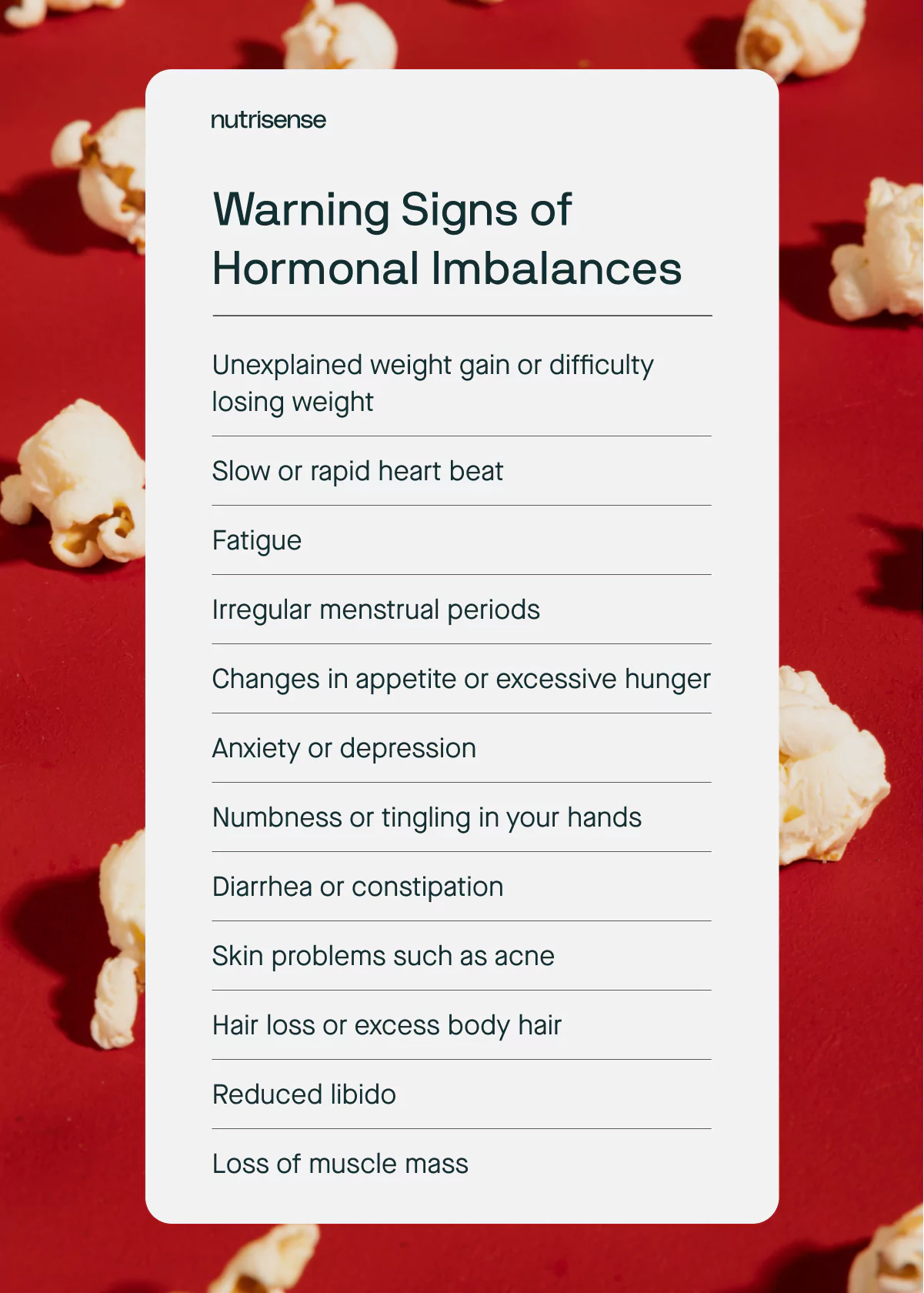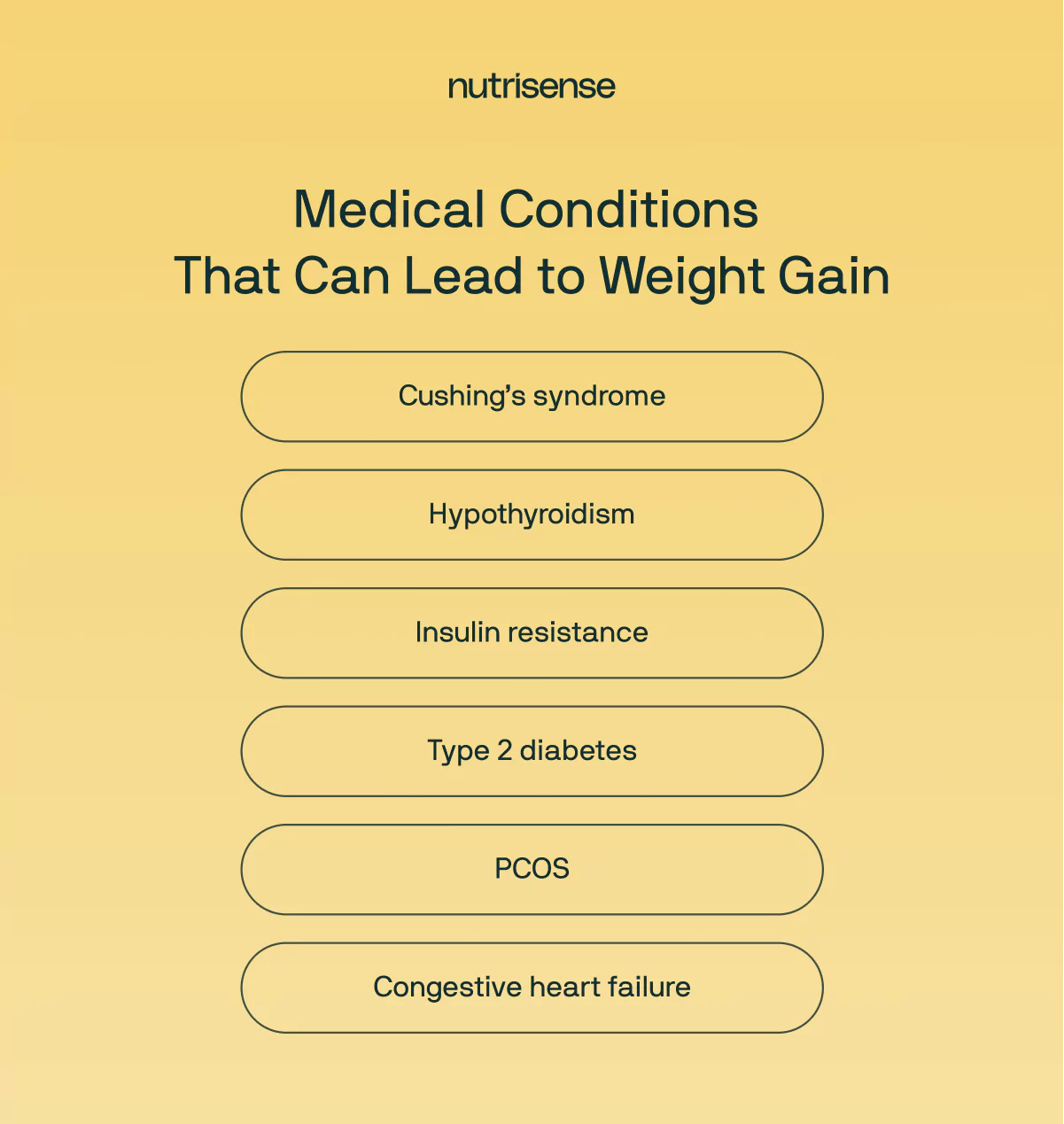6 Potential Causes of Unintentional Weight Gain

Key Takeaways
Unintentional weight gain can be a concerning and confusing experience, and is often a sign of underlying health issues that need attention. If you’ve been trying to get to the bottom of your recent weight gain, we’re here to help!
Recognizing the warning signs associated with unplanned or sudden weight gain and understanding their underlying causes is important for managing your weight and reducing the risk of any potential complications.
In this article, we will explore six potential causes of unintended weight gain and the warning signs associated with them. Read on to learn more!
Is Unintended Weight Gain Bad?
Many factors can lead to rapid weight gain—from something as simple as water retention or something more complex such as an endocrine disorder or kidney disease. And while weight gain doesn't have to be negative, there are certain reasons why you may want to pay attention to it.
Research shows that obesity or being overweight can increase your risk of serious health conditions, including:
- High blood pressure
- Type 2 diabetes
- Heart disease
- Certain types of cancer
- Lower quality of life
So, if you're concerned with a recent unexpected rise in your weight, here are six potential causes of weight gain and some warning signs to look out for.
1) Hormonal Imbalances

Hormones play a crucial role in regulating various bodily functions involved in weight gain, including inflammation, appetite, and fat storage. So, for some people, certain hormonal imbalances may contribute to unintentional weight gain.
When hormonal levels become disrupted, it can lead to changes in body weight. For example, an underactive thyroid gland, known as hypothyroidism, can result in decreased production of thyroid hormones, leading to a slower metabolic rate and weight gain.
Similarly, conditions such as polycystic ovary syndrome (PCOS) can cause hormonal imbalances in women, leading to weight gain, particularly around the abdomen. Hormonal changes during menopause can also affect weight distribution, often resulting in increased fat accumulation around the midsection.
Warning Signs of Hormonal Imbalances
Here are some common warning signs of hormonal imbalances.
- Unexplained weight gain or difficulty losing weight
- Slow or rapid heart beat
- Fatigue
- Irregular menstrual periods
- Changes in appetite or excessive hunger
- Anxiety or depression
- Numbness or tingling in your hands
- Diarrhea or constipation
- Skin problems, such as acne
- Hair loss or excess body hair
- Excess body hair
- Reduced libido
- Loss of muscle mass
2) Underlying Medical Condition

Underlying medical conditions are another umbrella of factors that may contribute to unintentional weight gain. This is because certain health conditions can disrupt the body's normal metabolic function, including hormone levels or fluid balance, leading to changes in body weight.
Remember that consulting a healthcare professional is crucial for an accurate diagnosis and appropriate treatment of any underlying medical conditions you may have.
Common Medical Conditions That Can Lead to Weight Gain
Some examples of medical conditions that can cause unintended weight gain include:
- Cushing's syndrome: Cushing’s syndrome occurs when the body is exposed to high levels of the hormone cortisol for an extended period. It can result from adrenal gland disorders or excessive use of corticosteroid medications. Weight gain in Cushing's syndrome typically occurs in the face, abdomen, and upper back.
- Hypothyroidism: When the thyroid gland doesn't produce enough thyroid hormones, it can lead to a slower metabolic rate. This condition can cause weight gain, fatigue, and difficulty losing weight despite efforts to maintain a healthy lifestyle.
- Insulin resistance: Insulin resistance occurs when the body's cells become less responsive to insulin, leading to high blood sugar levels. Type 2 diabetes, which can be caused in part by high blood sugar, is often associated with insulin resistance and weight gain, especially in the abdominal area.
- Polycystic ovary syndrome (PCOS): PCOS is a hormonal disorder that affects women. It can lead to irregular menstrual cycles, ovarian cysts, and higher levels of androgens (male hormones). Weight gain, particularly around the abdomen, is a common symptom of PCOS.
- Congestive heart failure: Congestive heart failure occurs when the heart's pumping ability is compromised, leading to fluid retention and weight gain.
- Type 2 diabetes: Type 2 diabetes is associated with insulin resistance, where the body does not effectively use insulin. This can lead to elevated blood sugar levels. Certain treatment options used for type 2 diabetes have been shown to contribute to unintentional weight gain.
3) Medications

Another potential cause of unintentional weight gain may be the medications you’re taking. Certain medications can affect appetite, hormones, metabolic rate, fluid retention, or even alter the body's fat storage patterns.
Not everyone will experience weight gain while taking medications, however, and the cause and extent of weight gain may vary among individuals. If you are concerned about weight gain related to your medications, consult with your healthcare provider.
Medications Known to Cause Weight Gain
Here are some examples of medications that can contribute to weight gain:
- Antidepressants: Certain antidepressant medications, including selective serotonin reuptake inhibitors (SSRIs) and tricyclic antidepressants (TCAs), and some atypical antidepressants, may lead to weight gain as a side effect.
- Steroids: Corticosteroids, commonly prescribed for various inflammatory conditions, autoimmune disorders, and asthma, can lead to fluid retention, changes in fat distribution, and weight gain.
- Antihistamines: Certain antihistamines used to manage allergies or as sleep aids can cause weight gain by increasing appetite.
- Diabetes medications: Some medications used in the treatment of diabetes, such as insulin and certain oral medications like sulfonylureas and thiazolidinediones, may contribute to weight gain.
- Beta blockers: Beta blockers are medications used to treat conditions like high blood pressure and heart disease. Research has shown that some beta blockers, like metoprolol, can contribute to weight gain.
- Antipsychotics: Some antipsychotic medications, particularly second-generation antipsychotics, are associated with weight gain. These medications can impact metabolic rate, appetite, and cause other metabolic changes that lead to weight gain.
4) Lack of Sleep or Insomnia

Lack of sleep or insomnia can contribute to unintentional weight gain. Sleep plays a vital role in regulating various physiological processes, including metabolic rate, appetite regulation, and hormone production.
Sleep deprivation can affect the production and regulation of hormones that impact appetite or elicit a stress response, leading to heightened appetite and craving and reducing the feeling of satiety. Lack of sleep can also disrupt the body's ability to regulate blood sugar levels effectively, leading to insulin resistance and impaired glucose tolerance, which can contribute to weight gain.
How to Recognize Poor Sleep Hygiene
Recognizing poor sleep hygiene is important for identifying potential factors that may be causing unintended weight gain. Here are some common indicators of poor sleep hygiene:
- Increased appetite
- Experiencing repetitive short interruptions in your sleep
- Difficulty falling or staying asleep
- Trouble concentrating or paying attention during the day
- Fatigue, including trouble staying awake and alert during the day
5) Lifestyle and Dietary Factors

Dietary factors and lifestyle changes can significantly contribute to unintentional weight gain. Our daily habits, including the types and amount of food we consume, as well as our physical activity levels, play a crucial role in maintaining a healthy weight.
Adopting a balanced and nutritious diet, engaging in appropriate amounts and types of physical activity, practicing mindful eating, managing stress effectively, and prioritizing quality sleep are all important strategies for maintaining a healthy weight.
Lifestyle Factors That May Lead to Weight Gain
Here are some examples of how lifestyle and dietary factors can contribute to weight gain or fluctuation:
- Dietary factors: Consuming a diet high in processed foods, sugary beverages, and unhealthy fats can contribute to weight gain. These foods are often calorie-dense and low in essential nutrients, leading to overconsumption and an imbalance in energy and nutrient intake. Inappropriate meal timing can also contribute to weight gain.
- Sedentary lifestyle: Engaging in minimal physical activity or leading a sedentary lifestyle can contribute to weight gain. Lack of regular exercise can reduce calorie expenditure, hamper metabolic rate, and decrease muscle mass, all of which can result in weight gain. However, overtraining or over-exercising may also be detrimental.
- Lack of Sleep: As mentioned earlier, inadequate sleep or poor sleep quality can disrupt hormonal regulation, increase appetite, and lead to weight gain. Sleep deprivation can also affect food choices and increase the desire for high-calorie foods.
- Alcohol Consumption: Excessive alcohol intake can contribute to weight gain. Alcoholic beverages are often high in calories and can increase appetite, leading to overeating. Alcohol may also negatively impact glucose regulation and reduce insulin sensitivity.
6) Experiencing Heightened Stress Levels

Technically speaking, nutritional imbalances, poor sleep and inappropriate exercise are all considered stressors for the body. Psychosocial stressors are yet another type of stress we may experience.
Heightened psychological stress levels can be a common cause of unintentional weight gain for certain people. When we experience chronic or prolonged stress, our bodies release cortisol, a hormone that plays a role in many areas of metabolism, including fat storage and distribution.
Stress can disrupt regular eating patterns, leading to irregular meal timings, increased food intake, or an increased desire for hyperpalatable and high-calorie foods. These disruptions can affect hunger and fullness cues, potentially leading to overeating or consuming unhealthy foods.
Ways to Reduce Stress
Managing stress goes beyond basic behavioral change and often requires that you alter your diet to lessen any stressors arising from nutritional imbalances themselves.
Engaging in stress-reducing activities may help mitigate the effects of stress and promote weight loss or management. Here are some stress-reduction tips:
- Deep breathing exercises, meditation or mindfulness: Practice deep, slow breathing to help calm the mind and relax the body. Engage in mindfulness techniques or meditation practices to promote relaxation and reduce stress.
- Appropriate exercise: Engage in appropriate types and amounts of physical activity regularly, such as walking, yoga, or any form of exercise that you enjoy. But make sure to properly fuel for your workouts to avoid adding even more stress to your body with the exercise itself.
- Adequate sleep: Prioritize quality sleep by establishing a consistent sleep schedule and creating a conducive sleep environment.
- Social support: Seek support from family, friends, or support groups to share your feelings and experiences, and gain perspective and advice.
- Engage in hobbies or activities you enjoy: Make time for activities that bring you joy and relaxation, such as reading, listening to music, or pursuing creative outlets.
- Balance your diet. Many people forget that nutritional imbalances, including blood sugar imbalances, can be very stressful for your body. Correcting these at their core can lighten your stress load significantly.
- Limit exposure to stressors: Identify sources of stress and try to limit or manage them as much as possible. This may involve setting boundaries, delegating tasks, or seeking professional help if necessary.
Find the right Nutrisense programto turn insight into progress.
Go Beyond Glucose Data with Nutrisense
Your glucose can significantly impact how your body feels and functions. That’s why stable levels are an important factor in supporting overall wellbeing. But viewing glucose isn't enough. Nutrisense, you’ll be able to learn how to use your body's data to make informed lifestyle choices that support healthy living.
One-to-one coaching
Sign up to access insurance-covered video calls to work with a glucose expert: a personal registered dietitian or certified nutritionist who will help tailor your lifestyle and diet to your goals.
Monitor and measure what matters
With the Nutrisense CGM Program, you can monitor your glucose with health tech like glucose biosensors and continuous glucose monitor (CGM)s, and analyze the trends over time with the Nutrisense App. This will help you make the most informed choices about the foods you consume and their impact on your health.
Find your best fit
Ready to take the first step? Start with our quiz to find the right Nutrisense program to help you take control.

Heather is a Registered and Licensed Dietitian Nutritionist (RDN, LDN), subject matter expert, and technical writer, with a master's degree in nutrition science from Bastyr University. She has a specialty in neuroendocrinology and has been working in the field of nutrition—including nutrition research, education, medical writing, and clinical integrative and functional nutrition—for over 15 years.




